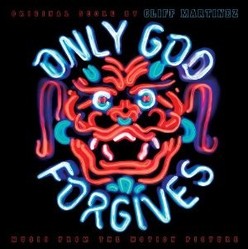
When it comes to providing electronic, minimalist, textural scores, Martinez is one of the best in the business. His trademark ambient soundscapes are equal parts sound design and film score, making him a unique and controversial name in the film music community. Perhaps it is this uniqueness that has drawn directors like Steven Soderbergh and recently Nicolas Winding Refn to form lasting alliances with the former Red Hot Chili Peppers drummer. Only God Forgives, composed for the most part during a five week stint in a Bangkok hotel room, inhabits that same general sonic world that Martinez has created for himself over the years, albeit with an even darker, more challenging ethnic flair.
Musically, Only God Forgives draws from numerous influences. Given the film’s setting of the seedy Bangkok underworld, Martinez sought to bring in some authentic Thai sounds to the film’s sonic palate. Though Refn originally intended the film’s karaoke numbers to be American country hits (Johnny Cash’s "Ring of Fire" and the like) he was thankfully swayed to allow Martinez the opportunity to explore routes more authentic to the setting. "Can’t Forget", sung by the menacing Lt. Chang, comes across as the most traditionally "folksy" of the Thai numbers. "Falling in Love", on the other hand, plays like a light, modern pop effort. The best of the karaoke songs is "You’re My Dream", heard in the end credits and composed and performed by the four-piece, Thai pop group Proud. Lullaby-like and haunting, the song is a stark contrast to the onscreen violence and generally dark demeanor of Refn’s film.
For Only God Forgives’ more tender moments (a phrase as inappropriate as they come) Martinez looked to German classical composer Richard Wagner for inspiration. The "love theme", heard in "Chang Vision" and "Crystal and the Bodybuilders" oozes melancholy like the darkest of Wagner’s broodings. Interestingly enough, the theme was applied to two disparate sections of the film, one involving a prostitute and another involving Julian’s mother, hinting at the character’s unique maternal relationship. That or it might have dawned on Martinez that the closest this film comes to romance is a particularly unsettling, surreal masturbation scene. You’ll also hear snippets of the theme’s somewhat meandering chord progression in other tracks but these two signify its most prominent occurrences. What’s more, these pieces afforded Martinez the opportunity to test the waters outside of his comfort zone, pushing the composer to make use of a live orchestra. Though budget constraints allowed only the main line of the "romantic" material to be played by the Bratislava Orchestra and the rest to be accomplished through synthesizers, it’s still interesting to hear Martinez tackle an orchestra.
The film’s most prominent theme, a minimalistic beat for electronics, percussion, and some Thai flavored twanging, is first heard in "Chang and Sword" but recurs numerous times during the course of the film. Also appearing in "Take It Off " and in variation in "Leave My Son in Peace", the theme reminds vaguely of the dark, pulsating moodiness of Cliff Martinez’s Contagion (for instance, the low wailing effect at 0:56), albeit with a much more ethnically appropriate flair. A faster tempo in the second end credits track "Bride of Chang" causes the theme to remind slightly more of Contagion but the title, on the other hand, suggests that the cue is meant to be a companion piece to Martinez’s Drive cue "Bride of Deluxe". The two share a similarly fast-paced beat, but Drive’s "Bride of Deluxe" and Only God Forgives' "Bride of Chang" are clearly separate beasts..
To thicken the ambiance, Martinez predictably includes his beloved Cristal Baschet, an immediately recognizable, trademark instrument of the composer that produces varying ambient tones from oscillating glass cylinders. Though it crops up numerous places as an accent to other instruments, the Cristal Baschet takes the center stage in "Crystal Checking In" and "Sister, Pt. 1", the latter of which features an almost identical, slightly more melancholic rendition of "I Drive" from Drive. Also present is a tension upping, rolling percussive effect over synthetic growling and building organ heard in “Only God Forgives” and "Leave My Son in Peace". It’s certainly an effective anxiety inducer and it works well in the film to enhance Refn’s visually assaulting imagery. If you have a pension for classic horror scores, this bit should remind you of Goblin’s iconic score for Dario Argento’s Suspiria and the frenetic percussion in the cue "Witch". Indeed, Martinez sited Goblin as a major influence for the album’s highlight cue, "Wanna Fight", in addition to composers Philip Glass and Ennio Morricone. A hypnotic piece centered on a core, ascending and descending synth line, "Wanna Fight" also makes use of an organ to truly nightmarish effect. That being said, though, the cue is an extremely minimalist exercise in score composition, proving quite repetitive and undergoing only minor variation ala the unrelenting horror scores of John Carpenter. I have a feeling, however, that unrelenting was what Nicolas Winding Refn had in mind.
Cliff Martinez’s score for Only God Forgives is a very good match for the film but as a standalone listening experience it will not be to most people’s tastes. If you were a fan, however, of Nicolas Winding Refn’s dark and divisive "experience" of a movie or if you are generally interested in challenging, experimental music, I would recommend exploring Martinez’s score as it is an effective and unsettling extension of the downbeat tone of the film. Difficult but well-done, the score does a lot of the heavy lifting in this film and will likely have people arguing its stylistic merits for quite a while... and maybe that’s the point.
| Label: Milan Records Availability: 17 track edition (the subject of this review) and 23 track deluxe edition JUMP TO FILM REVIEW | |

 RSS Feed
RSS Feed
